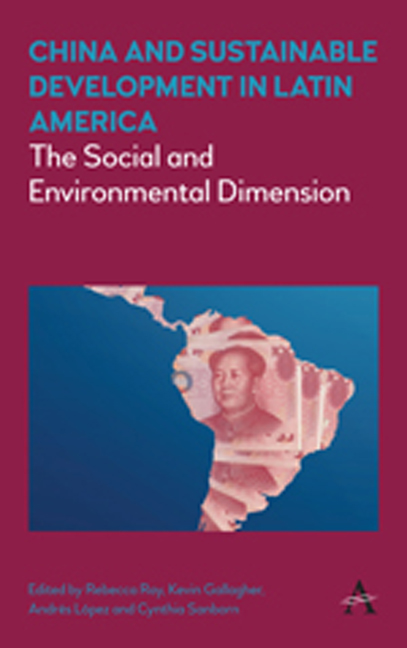Book contents
- Frontmatter
- Contents
- List of Illustrations
- Acknowledgments
- Part I INTRODUCTION AND REGIONAL OVERVIEW
- Part II CHINA'S AND LATIN AMERICA'S HYDROCARBONS SECTORS
- Part III CHINA'S AND LATIN AMERICA'S MINING SECTORS
- Part IV CHINA'S AND LATIN AMERICA'S AGRICULTURAL SECTORS
- Part V CHINA'S AND LATIN AMERICA'S MANUFACTURING SECTORS
- Chapter 8 Chinese Incidence on the Chilean Solar Power Sector
- Chapter 9 China in Mexico: Some Environmental and Employment Decisions
- Notes on Contributors
- Index
Chapter 8 - Chinese Incidence on the Chilean Solar Power Sector
from Part V - CHINA'S AND LATIN AMERICA'S MANUFACTURING SECTORS
Published online by Cambridge University Press: 12 September 2017
- Frontmatter
- Contents
- List of Illustrations
- Acknowledgments
- Part I INTRODUCTION AND REGIONAL OVERVIEW
- Part II CHINA'S AND LATIN AMERICA'S HYDROCARBONS SECTORS
- Part III CHINA'S AND LATIN AMERICA'S MINING SECTORS
- Part IV CHINA'S AND LATIN AMERICA'S AGRICULTURAL SECTORS
- Part V CHINA'S AND LATIN AMERICA'S MANUFACTURING SECTORS
- Chapter 8 Chinese Incidence on the Chilean Solar Power Sector
- Chapter 9 China in Mexico: Some Environmental and Employment Decisions
- Notes on Contributors
- Index
Summary
Over the last decade, China has become an important ally in Chile's goal of diversifying its energy matrix away from fossil fuels. China's overproduction of solar PV panels came at just the right time for Chile, which was looking for new sources of low- emissions electricity after Argentina drastically reduced its gas exports. The resulting relationship between Chile and China is very promising for both parties. Solar power is still nascent in Chile, but growing quickly: as of this writing, over half of new power projects with approved environmental permits are solar.
Chile can maximize the local benefit from this new relationship by encouraging linkages, establishing norms and investing in education. Encouraging linkages can include training local companies to perform related services such as equipment maintenance, which only a few Chilean firms currently provide. Establishing quality norms for imported PV panels can protect the grid from defective or unsafe equipment and would not be prohibitively complicated: Chile could require certification from one of the international bodies or adopt international norms. Finally, the Chilean state should consider investing in education for residential and business consumers of PV panels as well as for potential workers in the industry.
Introduction
Chile's power sector is characterized by mainly relying on large power plants based on hydropower and fossil fuels and by long distribution lines. By 2013 installed capacity in Chile was just over 18,000 MW. A key structural change in the Chilean electricity mix occurred in 1998 when low- cost natural gas from Argentina was introduced. However, in 2004 drastic export restrictions from Argentina implied an end to this natural- gas- based expansion and in 2008 the gas valve to Chile was finally completely closed.
This Chilean energy crisis, together with high international oil prices and an unprecedented drought that continues through this writing have triggered a complex situation in the Chilean power sector. The lack of natural gas has been remediated by introducing other imported inputs of more polluting or more expensive sources of energy, such as coal and oil.
- Type
- Chapter
- Information
- China and Sustainable Development in Latin AmericaThe Social and Environmental Dimension, pp. 269 - 320Publisher: Anthem PressPrint publication year: 2017



